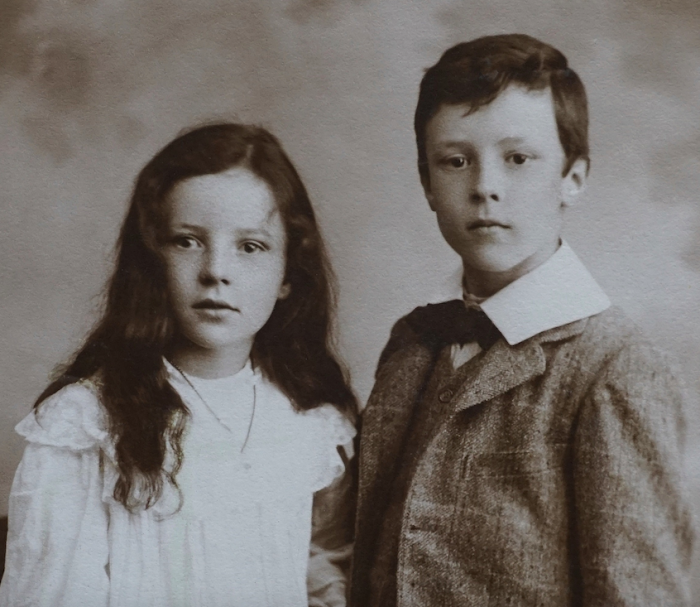It’s summer.
A hot, humid Southern Minnesota summer, where you sweat, wear no shoes, and scratch mosquito bites that perpetually occupy your legs because you were too busy to use bug spray. It’s getting later in the day, the sting of the sun isn’t as intense, and you gather friends to steal a quick game of neighborhood baseball because you really believe someday you might play for the Twins—even though you are a girl.
You bring out the rubber tee, the only ball you can find, and a wooden bat. Everyone takes their positions, and you stick your little brother behind home plate because he is four and can’t play a real position. You play a few innings, and all is going fantastically well until your brother catches onto the fact that his position is one of the ancillaries and he steps in front of the bat.
Whack.
He looks at you, stunned, his front teeth bloody and dangling. Tears come, you hug him, you rush to your mom and then the doctor, and he returns with fewer teeth—but they were deciduous so no matter, permanent ones will still come.
This day burns sharp in my memory; it is one of the most acute early childhood memories I have of my brother. I remember feeling horrible because I had failed to protect him. And so, after that, I vigilantly become my brother’s keeper.
There were years when he didn’t need one—he was too strong and cool—and while I was away at college, he became homecoming king, running back, Eagle Scout, funny, stylish.
But then came depression.
It started with a breakup. We knew he was enamored, but the girl was a wee bit wild, which turned into a disaster. He just couldn’t quite get over her. We took turns consoling him, keeping up his spirits. Add to that a one-night stay in the hospital, then moving in with us to eventually shrug it off. Life continued; we breathed easier.
Years passed and one day my brother mentioned getting down again. My radar was up, and sure enough, we went through another spell—this time complete with a crisis line call then full-blown in-patient hospitalization. No girl this time, just severe depression. But we made it through.
He got well, moved in again, and eventually became stable for the next 14 years. He ran a marathon, became the favorite uncle, and held a job where he was beloved by his peers. He met his wife, fell in love, and started a family.
Fast forward to late 2021. Another depression. This time with some bad luck: a move, a leave of absence from work, and an attempted overdose. Messages flooded our phones, cries for help, long phone calls spent loving, caring, rationalizing, pleading, reassuring.
We had discussions about how depression was a disease but suicide was not a treatment option. My brother’s brain seemed to be robbed; his feel-good neurohormones gone. He seemed empty and lost. He prayed for healing, and he believed in God’s love and mercy. He went to doctors and hospitals. He took his medication. He tried treatments that were new, experimental, invasive, and expensive. He wanted to be well.
Then one day, the pain must have been too much, because he left us. My beautiful brother succumbed to his now seemingly terminal depression, and his pain became our pain—a loss so great that it hurt to breathe.
A friend reached out to me who had suffered a similar loss. She told me the only way it made sense to her was to believe that her brother had made a really bad decision on the day of his death. That meant everything to me, and I felt less alone. I looked at her strength and kindness and clung tightly to that, hoping days ahead could ease the pain that occupied every ounce of my body and soul.
Human loss is hard and painful, but the pain is compounded considerably with suicide. Suicide not only leaves us with the death of a loved one, but it also adds the complication of anger, second-guessing, and confusion. For this reason, perhaps depression and suicide are the most misunderstood of all diseases. It seems self-inflicted and appears voluntary and therefore, different from a death caused by physical illness or accident.
But this simply isn’t true.
Similar to a terminal disease, a person who falls victim to suicide dies, as the does the victim of cancer, an accident, a fatal heart attack.
In the case of depression, the breakdown is emotional rather than physical—and as a physician healer, I do not believe my brother nor any of my patients who suffer from this disease would voluntarily choose this. Theirs can be, in some cases, a terminal disease. Every single day, people die of terminal diseases, illnesses, and accidents. And no matter how much medicine, love, and attention are provided, the outcome cannot be averted. It is a sad reality of life, of medicine, and of love.
All I can do is know that I loved my brother, I still love him, and I will forever be proud to have been his sister. His legacy now is for me to protect and care for those who suffer the same, to do what I can, when I can, knowing full well that mental illness is a disease one and the same as all of the others that I treat as an internist.
As for my brother, and for me, his keeper, I know that he belongs to the ages, forever mine, forever loved.









Read 0 comments and reply